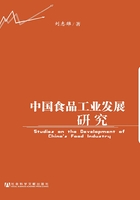
Abstract
As China is such a populous and agricultural country,food industry is of vital importance to the national economy and living standards. In the past decades,the food industry has made big progress,with it’s comprehensive productivity improved drastically,as well as the people’s nutritional level. Especially during the 11th five-year plan,rapid growth continues in China’s food industry. For example,annual growth rate of the total value was about 24.7% and the total value of food industry approximated to RMB 6.1273 trillion,accounting for 8.8% of the total industrial value in 2010.
With the industrialization,rapid urbanization and economic globalization,the food industry is still facing many problems. For instance,the Competitiveness of food industry is not strong and the technical efficiency is not high enough. If these problems cannot be handled successfully,not only can people’s increasing demands for processed food not be satisfied,but also it is unfavorable for our food industry joining the international competition.
According to the standard classification in China,food industry includes the food processing industry,the food manufacturing industry,the beverage and the tobacco. Furthermore,in accordance with the SITC,14 divided industries are included like meat products. Here different classification will be used in different places on the basis of the research. The book is divided into six parts,with the main themes of each part as follows:
Part one reviews the development of China’s food industry,and focus on discussing the growth and spacial distribution of China’s food industry,then will have an international comparison,which is aimed at providing background information. The results indicate that the food industry grew fairly quick and the level of industrial agglomeration is higher,yet compared to developed countries,there still exists a relatively great gap;Along with the country’s strong economic growth,several key factors,including population,consumer’s increasing disposable income and quickening life pace,have fueled the fast development of China’s food industry.
Part two examines the changes of the competitiveness of China’s food industry during the development of the industry. Firstly,this part shows that China’s food industry is less competitive within the market of other main countries in the world through analyzing the competitiveness of China’s food industry based on the whole industrial level. Secondly,in accordance with the SITC,the analysis of competitiveness will also be conducted about the 14 divided industries. The results show that China’s food industry,especially in labor-intensive divided industries,have comparative advantages which are disappearing slowly,meanwhile land-intensive industries haven’t. Thirdly,on the basis of analysis above,the book uses the Constant Market Share Model(CMS)to analyze reasons why the competitiveness of divided food industries is varying. The study shows that exports of food industries are influenced more by the general growth and competent effect.
Part three uses Stochastic Frontier Production Model to analyze the technical efficiency of our four divided food industries. The analysis shows that the technical efficiency of food industry is increasing steadily,but still has obvious loss of technical efficiency. Among the eastern,central and western area,the technical efficiency of food industry is different more or less,but the variation is not that huge. There are several factors,including Engel Coefficient of urban or rural,tax rate,agricultural resource endowment,urbanization,FDI,food safety,influencing the technical efficiency of food processing.
Part four evaluates the effects of FDI of food industry. With China’s Reform and Opening up,more and more foreign direct investment go into China. The empirical research indicates that FDI has no significant effects on the domestic food processing industry and food manufacturing industry.
Part five analyzes opportunities and challenges faced by the development of China’s food industry.
At last,based on the research above,some corresponding political suggestions are given for further discussion.